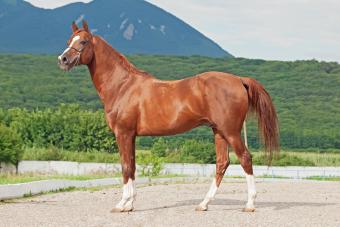
Horses are herbivores. Grass and weeds are a horse's natural food, and most owners allow horses lots of grazing time on a pasture. With that in mind, working equines need to move faster and for longer. These working horses need additional food called forage, which includes hay and concentrated feed.
What Do Horses Eat?
The type and quantity of food required depend on the kind of horse, age, work he does each day, and grazing availability. Horses graze for up to 20 hours a day to obtain the calories needed, and these large animals move slowly as they eat. Horses living in natural conditions survive on grass and other plants. Working horses need additional food in the form of forage like hay.
Pasture Management
Grass grows in every climate and environment, making it the best food for all grazing animals, including horses. The general rule is one horse per acre. Horses produce a lot of droppings and don't enjoy eating near them, so pasture management includes clean-up! Most owners move horses into different pastures throughout the year.
Grass
Grass grows from the base, so the leaves may be constantly clipped off, continuing to grow. Eating grass provides horses with hours of occupation and exercise.

Weeds
A pasture contains many different types of grasses and other plants. Some of the plants are clover and weeds! Horses like a range of tastes, and horse owners must remove any toxic weeds like ragwort.
Provide Hay and Forage When Grazing Isn't Possible
When horses are working, or during winter when their food is less freely available, owners need to provide additional food for forage, including concentrated feeds. Forage is either hay or alfalfa, a horse's natural foodstuff dried and prepared for winter. Hay is provided when grazing on pasture is not possible. The type and quantity of food depend on the horse, age, and work he is doing.
Hay
A horse's gut obtains nutrients from plant fiber. Grass or hay and other forage comprise the bulk of a horse's diet. Hay needs to make up the majority of a horse's supplementary food.
Concentrated Foods
What's in the feed? Concentrated foods are primarily mixtures of various ingredients. The feed consists of chopped forage, cereals, and seeds. Most blends also contain vitamins and micronutrients. The mix may also include pellets made of grains or chaffs.
Salt
Horses need salt! Salt helps regulate your horse's intake of water, and it is an essential nutrient. Each horse and each pasture needs a dedicated source of salt.
Supplements
Various supplements include vegetable oil and cod-liver oil to provide calories. Many types of multi-vitamin products are available in pellet or powder form containing minerals, trace elements, and probiotics.
Veggies
Carrots are among the top healthy treats for horses and may be fed in large quantities. Always avoid vegetables in the cabbage family. This includes turnips, cabbages, kale, and broccoli, as this may cause an upset stomach.

Fresh Water
A balanced diet includes fresh water. Water is typically in a trough or large buckets and must be readily available all the time. Always watch your horse around the water trough as sometimes this area is a popular place for your giant buddy to assert his authority.
A Horse's Diet Needs to Be Balanced
During the winter or when a horse spends the day working, you must feed additional forage such as hay or alfalfa and concentrated food. A horse who spends the day grazing out on the pasture has plenty of grass, and this will keep him healthy and happy. Always consult with an equine vet or large animal vet if you think your horse is losing weight or you're unsure about which concentrated feeds to buy.







